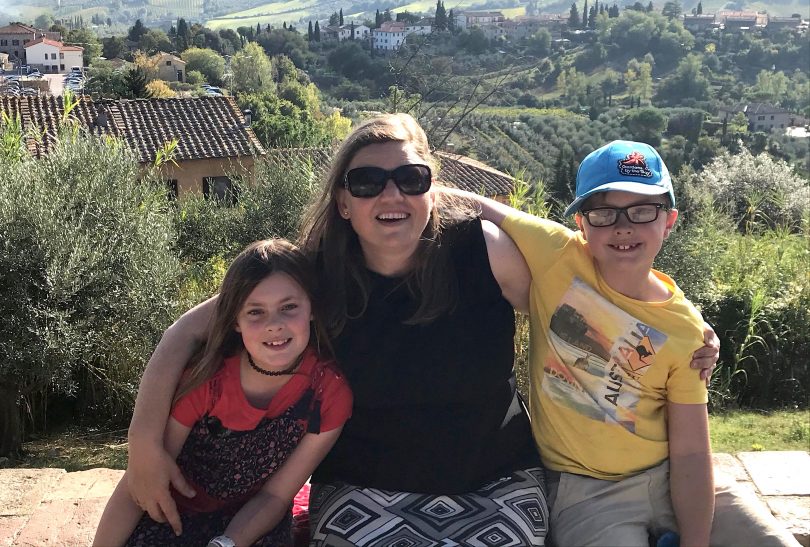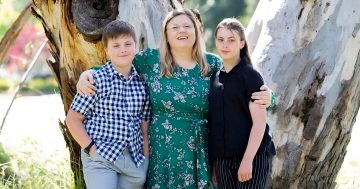
“This is not the 1950s with the stigma and shame of hidden adoption,” says Bernadette Blenkiron, with her two children. Photo: Supplied.
A Canberra mother of two adopted children has become a driving force behind proposed changes to legislation in the ACT that will see both birth parents named on the birth certificates of adopted children.
Bernadette Blenkiron adopted her two children, now aged 9 and 10, in 2016, but their birth certificates named her as their mother while the father was stated as ‘unknown’. Her children’s birth certificates also stated that Ms Blenkiron gave birth to the children in hospital.
“I had been warned, but it was confronting for me to see it presented in this way,” she said.
“Wiping out reference to their biological parents felt completely inappropriate to me and so factually incorrect. No one was pretending I had given birth to these kids. This is not the 1950s with the stigma and shame of hidden adoption.
“They were so young then that I knew it would not bother them at that stage, but I was concerned by it. This was not a document that I would want them to have to present to get a passport later in life.”
In the ACT Legislative Assembly on Thursday (23 July), ACT Minister for Justice Shane Rattenbury’s proposed changes were introduced to allow for integrated birth certificates for adopted children that will now recognise their personal and family history.
“The current process of issuing a birth certificate with adoptive parents listed as birth parents reflects historical attitudes where secrecy was considered important to protect children and adoptive families from the stigma associated with adoption,” Mr Rattenbury said today.
“Integrated birth certificates mean recognition that those who have been adopted deserve the option of a birth certificate that shakes off this historical stigma, and that acknowledges the reality of their lived experience.”
Ms Blenkiron said she has been pushing the ACT Government to update the Births, Deaths and Marriages Act to be in line with other jurisdictions.
“This change in legislation helps formalise the truth that my children already know and reaffirms in writing my role as their mother,” she said.
“It took its time, and I kept chasing, but I am pleased that Minister Rattenbury has been able to achieve this.
“Ideally it should, and could, be so simply portrayed in a birth certificate that reflects they were born on this day at this hospital to their biological parents, and were subsequently adopted on this date into this family. That way, no ties are severed and connections to siblings and other family members are not lost.”
Ms Blenkiron has also explained to her nine-year-old that their birth certificate would show they were born to their biological parents, and then adopted.
“My son responded with, ‘how disrespectful, you don’t treat my dad like that and take him off my birth certificate. He is my dad’.
“That sums it up for me,” Ms Blenkiron said.
However, she said more work needs to be done to make it easier for people to adopt their children.
“While an accurate birth certificate is an important step for adoptees, there are many families I know that are desperate to adopt and formalise the relationship they already have with children in their care,” she said.
“Statistics show that adoption is an all too rare an event in the ACT. The legislation needs to change to see greater security and stability offered to those children who have been with loving families for years when it is clear they cannot return to their biological family.
“There is so much I could say here, but I hope to see an increase in the number of children being adopted in the ACT and some national consistency in approach.”

Minister for Justice Shane Rattenbury and Tait McAllister from A Gender Agenda outside the ACT Legislative Assembly today. Photo: Supplied.
Another bill was also introduced in the Legislative Assembly this week to allow young people aged between 12 and 16 to have their true lived gender identity recognised on official documents.
The proposed legislation will give young transgender, intersex and gender-diverse Canberrans more accessible pathways to change their given names and sex details on birth certificates.
“Discrimination, prejudice and bullying adversely affect the emotional and physical safety of transgender, intersex and gender-diverse children and young people. Everyone deserves to have a birth certificate that reflects their true identity,” Mr Rattenbury said.
Both pieces of legislation will be debated next week and are expected to be agreed in principle.













